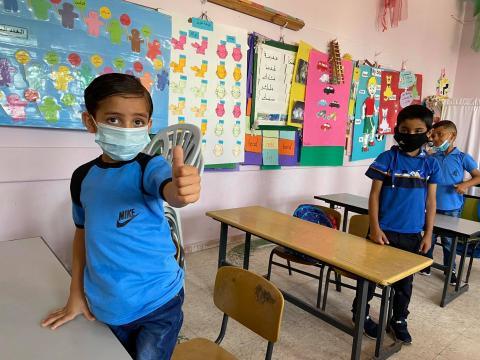Changing Course, Transforming Education

By Lauren Taylor
The classroom was still dark. Intelligent, energetic high school girls in Nablus had just finished presenting what they learned through one of our environmental projects. As we turned to leave the classroom for the rooftop, where we would show the international visitors the solar panel system the project funded, an eleven-year-old girl asked if she could tell us about her experience the month before during an escalation of violence. She explained how Israeli soldiers stormed the all-girls’ school, as part of a multi-city search operation. To enter the school, they used tear gas, which damaged her lungs and placed her in the hospital. As she told her story, she said, almost as if it was her fault, “I didn’t know that when the soldiers throw tear gas, I shouldn’t get down on the floor. I should go outside.”
Fragile contexts are painful. On almost every field visit, students share with me their stories of violence. Each one is horrific in its own right. Yet three years later, this story remains with me foremost because of what she said about not knowing how to handle tear gas. What eleven-year-old should know how to handle tear gas?! That knowledge should not be part of any childhood.
No matter what one’s national, political, or religious views, I hope most would agree that schools should be off limits as tools of conflict. When parents send their children to school each morning, they do so hoping they will be safe. And schools should be – safe, joyful havens for children to learn, grow, and develop. After all, education is the foundation for life.
Yet in fragile contexts, the quest for a true childhood feels next to impossible. In the West Bank, there are military bases and outputs constructed within 500 meters of 200 pre-existing schools. The United Nations1 reports there were 103 education-related incidents in 2021 with settlers and military that affected schools and 7,500 students. These incidents injured 171 students and included 26 instances of weapon fires and 62 other interferences such military entering schools. And children struggle to access schools. The Palestinian Ministry of Education reported 6,759 students and 978 teachers were delayed on their way to school, and 90 children and 31 teachers were arrested. According to the Ministry, 5,781 single subject, 40-minute classes were lost, all in a time when the COVID-19 pandemic already wreaks havoc on education.
Conflict’s influence on planning as well as poverty also affect the safety of school environments, including basic needs like water and toilets. A 2021 assessment of a small number of schools in Area C2 found 93% lacked emergency instructions, half required building maintenance and fences, and half had insufficient latrines. 93% of students bring their own bottles for drinking.
And political conflict is not the only factor preventing safe schools. Peer-to-peer violence remains a global problem, including in the West Bank. In a 2021 baseline assessment for our European Union-funded project, SAFE, only 49.9% of children (55.5% boys and 44.5% girls) reported good relationships with teaches and peers. There is still violent discipline by some teachers. One mother, Huda, from a Hebron village, told us of a teacher who “had physically punished my son, who came home crying and saying he won't go back to school. I went to the school and talked to the teacher, who said he knows well how to treat and educate children."
None of this is OK.
January 24th is International Day of Education. This year’s theme is ‘Changing course, transforming education’ in recognition a rebalancing is desperately needed. We have ‘a choice to continue on the unstainable path or to radically change course before it is too late’.3
World Vision can and does partner with government donors, other agencies, and schools to strengthen the protective environment, improve teaching practices, and work with administrators on violence prevention policies. Many of the previously mentioned needs in Area C are actively being address through current World Vision projects.
Yet, we cannot change, transform, and rebalance on our own. Issues of conflict, such as the rules of engagement by militaries or the prosecution of civilians who violate school safety, are beyond us. We need to mobilize actors with the political will to place the needs of children and their education above the politics of identity and conflict. Most of all, we need a world passionately committed to ensure schools are safe havens. Children have the right to enjoy school, feel safe, and be protected. We owe children this much.
Lauren Taylor is the National Director of World Vision Jerusalem – West Bank – Gaza
All data provided by the Ministry of Education or through World Vision’s own systems.
1. OCHA and UNICEF Dashboard for Education-Related Incidents.
2. The Oslo Accords classified lands in the West Bank by Area A, B, or C. The Israeli military has full authority in Area C regarding services and security.
3. https://en.unesco.org/sites/default/files/education-day-2022-cn-en.pdf